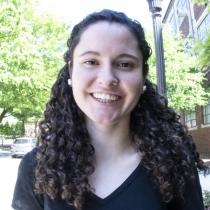
Myra Lattimore
What is your next adventure?
Over the summer, I'll be interning at JPL doing computer-aided engineering. In the fall, I'll start my graduate program at ASDL, probably continuing work on model-based systems engineering with [Dr.] Russell Peak.
What about your next adventure are you most looking forward to?
I'm excited to be going to graduate school because there's so much to learn. And, while you learn a lot in undergraduate school, there always comes a point where the professor says 'but we cover that in graduate school.' I want to get beyond that point.
Did you have any previous co-op, internship, or research experience in this area?
Definitely research. I've been fortunate, getting the chance to work in the ASDL and the HPEPL. I've gotten invaluable experience that you just can't get elsewhere. Sophomore year I started looking for opportunities, because, really, that's what Georgia Tech is known for - research. In the ASDL I learned how to use SysML, a language that's used at NASA to model payload adapters for the SLS. I really enjoyed it, but I didn't want to just focus on software. In [AE] 1601, we had a project that focused on different types of propulsion, and I knew that the High Powered Electric Propulsion Lab was doing some great work, so I emailed the professor [Mitchell Walker] and told him I was looking for some hands-on research. He looked at my resume, asked me what I wanted to get from HPEPL, and, I guess because my grades were good, he gave me the chance to work there. Since then, I've worked on magnito hydro dynamics [MHD] to extract power from the exhaust that's generated from a rocket, and I've help develop a new plasma antenna that's more effective at generating low frequency signals for communications. After junior year, I was able to get an internship at JPL, developing documentation for best practices in modeling using SysML. As it turns out, they were looking for interns who know that language, so they came to ASDL looking because they knew that ASDL was teaching that.
Before I got to JPL, I told myself something that I still tell myself: "Don't be complacent. You are working in a lab where you are seeing people work on the Mars Rover every day. It's truly history in the making." It's important to reflect on how exciting those things are.
How did your educational experience at Georgia Tech help you to achieve your goal?
I think one of the greatest things is, I grew up in a small town -- one where I still know the names of everyone who graduated with me -- so when I came to Georgia Tech, a huge university, there was a variety of different people going different places and using different paths. What I began to see fairly quickly was that there is more than one way to get to a successful place, and sometimes if you fail in one area you'll be opened up to succeed elsewhere. I applied to Georgia Tech with zero intention of coming here. I was set on attending one of two schools that are closer to home [Pennsylvania]. But I didn't get into those schools, and it has worked out so well. I had been set on one path, but I ended up having to succeed on another one. Along the way, that story has repeated itself again and again.
What advice would you give to an underclassman who would like to follow the same path?
You need to ask for what you want because, sometimes, getting it is as simple as asking. I got invited to do research at ASDL because I'd seen a talk by [research engineer] Russell Peak and it got me curious. So I emailed him and asked to join his group. At the time, it was daunting, but if I hadn't asked, I'd never have been invited. The other thing I'd say is: a lot of times at Tech you can get concerned about whether your belong. Am I good enough? Will I fail? But you are better off remembering that if you are curious and motivated you already have two skills that smart people value. You can't teach those things. And you can always improve on what you know: people are willing to help you if you are curious and motivated.